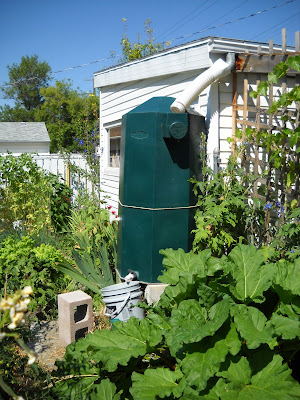The 20x50 m lot (guessing) we occupy has its footprint divided among buildings, garden (ground we care for) and ground we don't really care for (pavement, lawn, ugly bits). Let's say each of these is very roughly a third of the total area (still guessing). If we can divert all the rain that falls on the buildings toward the garden, rainfall is essentially doubled. We try. We aren't there yet.
 Two 125 gallon tanks are currently set up to collect run-off from the carport and the eastern half of the house. There is one more tank, 220 gallons, lying under the spruce tree, waiting for a spot at the western side of the house. Once we get this in place, we should have no need to put City water on the garden, in a typical year, unless we keep expanding the garden area.
Two 125 gallon tanks are currently set up to collect run-off from the carport and the eastern half of the house. There is one more tank, 220 gallons, lying under the spruce tree, waiting for a spot at the western side of the house. Once we get this in place, we should have no need to put City water on the garden, in a typical year, unless we keep expanding the garden area.Call us stupid - we have been filling watering cans from the tanks and carrying them around the garden. Many trips, many hours spent. Much of that time could have been saved with the aid of a garden hose. The pressure created by a half-full tank at the current height is as good as the pressure we get from the municipal system. And the carport tank (right) could still be raised a few inches. Why we haven't been doing this - no idea.
We ran out of water about a week ago. The last substantial downpour had been July 12, after which we were gravely disappointed to discover that very little of it had been captured. Too much accumulated crud in the filters. So we used City water once or twice. The plants don't need to be punished for our neglect. Thursday brought a fine afternoon thundershower and we are back in business for a couple of weeks.
 The tanks are excellent - enclosed (no mosquito incubation), filtered (not potable, but no build up of solids inside), have taps for pouring and taps with hose attachments, and aren't too hard on the eyes. Potential problems - plastic degrades in the sun (there are cracks in some of the moving parts), filters get clogged with debris from the roofs.
The tanks are excellent - enclosed (no mosquito incubation), filtered (not potable, but no build up of solids inside), have taps for pouring and taps with hose attachments, and aren't too hard on the eyes. Potential problems - plastic degrades in the sun (there are cracks in some of the moving parts), filters get clogged with debris from the roofs. Known problem with our water tanks - ecological footprint of plastic production likely is bigger than taking water from the municipal system over the useful life of the tank. Owen Dell has a few words to say about that. Furthermore, our outdoor water consumption (we don't water grass) is dwarfed by our indoor household consumption. Typically, we go through about 7 cubic meters of water in a month (according to the utilities bill), for drinking, cooking, washing, showering, and flushing. The imperial gallon equivalent is about 1500, or both of our tanks filled and emptied 6 times. I'm fairly certain this does not happen over the course of the entire summer, let alone one month. I have no argument with Mr. Dell's logic. What he doesn't address is the aspect of awareness raised by local water collection and distribution. I now happen to know that the average local rainfall is sufficient for our landscaping needs, but would not be adequate to supply our indoor needs as well. Good thing we have the Oldman River bringing water from the mountains. We attempt to keep our landscape watering within the limits of our local rainfall. Otherwise, why not keep the lawn green for the sake of a beautiful neighbourhood? As for the carbon footprint equation, I can't calculate it. I suspect our payback period might be a little shorter than some others because our water has to be pumped 100m up from the river (I'm curious about how this is done) and that has to take a little more energy than letting it flow down from an elevated reservoir as in Vancouver. Anyway, the tanks have been manufactured - that cost is sunk - and there are far worse ways to spend 60 pounds (or whatever) of plastic.

No comments:
Post a Comment